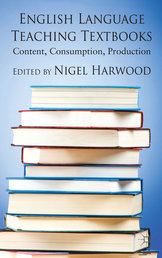by Jürgen Kurtz, Justus Liebig University, Giessen, Germany
About a year ago, I launched a research project on textbook use in German EFL classrooms. I was astounded to see how relatively little attention this fundamental aspect of everyday teaching and learning practice has received in German TEFL research in recent years. Up to date, systematic, especially large-scale empirical studies on this are virtually non-existent (not only in Germany). In other words, this is a ‘grey’ area world-wide, dominated by the assumption that introducing and using innovative textbooks is conducive to enhancing the ‘quality’ (i.e. the efficiency and effectiveness) of teaching and learning foreign languages in schools.
For a brief overview of research in the three most important areas of EFL textbook research (i.e. textbook analysis/critique, textbook use and textbook development), see my most recent publication (written in German) – in combination, perhaps, with my views on the role of the textbook in the EFL classroom, published in an eight-part series of posts on this blog:
Kurtz, Jürgen (2010): „Zum Umgang mit dem Lehrwerk im Englischunterricht“. In: Fuchs, Eckhardt / Kahlert, Joachim / Sandfuchs, Uwe (Hrsg.) (2010): Schulbuch konkret. Kontexte. Produktion. Unterricht. Bad Heilbrunn: Klinkhardt, 149-163.

Coming up in a few weeks is a special issue on textbook analysis, development and actual classroom use in the German FL/SL journal “Fremdsprachen Lehren und Lernen” (FLuL), guest edited by me. Here, the focus is on current textbooks, their analysis and use in English, French, Spanish, and Russian as a Foreign language classrooms as well as on research dealing with multilingual approaches to FL teaching, learning and materials/media. The contributors to this issue are Engelbert Thaler (University of Augsburg, Germany); Members of The English Academy, Andreas Grünewald (University of Bremen, Germany), Britta Hufeisen (University of Darmstadt, Germany), Grit Mehlhorn (University of Leipzig, Germany) & Heike Wapenhans (Humboldt-University Berlin, Germany), Hélène Martinez (University of Kassel, Germany), and Markus Bohnensteffen (Carolus-Magnus-Gymnasium Marsberg, Germany, an academic high school leading to the Abitur, the central German university entrance qualification).
English abstracts of the papers (which are written in German):
Engelbert Thaler addresses important issues concerning ‘the future of the textbook’ as well the as ‘the textbook of the future’ in the EFL classroom. Beginning with a brief outline of what is presently known about textbook use in EFL classrooms in the current ‘Internet Age’, he goes on to present findings from two case studies that point to emerging trends in textbook development. Pulling these strands together, the paper concludes with some useful insights into the development and use of textbooks and their supplementary materials in the future.
Members of The English Academy look at the current state and the future of foreign language textbook development and research, focusing on major achievements as well as new challenges. In this context, the authors problematize the opportunities and interactive potential that electronic media have added to textbook development and use, particularly those of interest for foreign language teaching in schools.
Andreas Grünewald argues that promoting intercultural competence has gained considerable momentum since the introduction of Foreign Language Education Standards in Germany in 2004. So what does today’s foreign language classroom look like with respect to cultural and intercultural learning? Few
empirical studies have addressed this question, as the cognitive-affective processes involved are exceedingly complex and nearly impossible to depict fully in an objective way. However, the content of textbooks can give a good indication of what could be learned from them. Accordingly, he analyzes recently published school textbooks for French and Spanish for their promotion of intercultural competence. The paper presents his findings, highlighting the degree to which these recent textbooks now incorporate promotion of intercultural competence as an actual objective.
Grit Mehlhorn & Heike Wapenhans point out that the year 2008 saw the introduction of a new generation of textbooks for Russian as a second or third foreign language. From a methodological standpoint, these new textbooks are comparable to many being used for the instruction of other foreign languages. In their article, they take a look at how these textbooks are designed to support teachers in the difficult task of developing communicative and intercultural competence, in addition to language skills. They extend their discussion to approaches that have been recommended for tertiary language learning, suggestions for self-reflection and self-assessment by learners, and
considerations of authenticity and media in textbooks. Finally, they identify the
strengths of these new textbooks and note those areas that still need
improvement.
Hélène Martinez states that in the course of the implementation of the Common
European Framework of Reference (CEFR), the definition of the term ‘competence’ in foreign language teaching and learning and the issue of its measurability have been controversially discussed. In her paper she questions to what extent the development of the different types of competence and skills required by the CEFR, e.g. intercultural communicative competence, is embedded in current French and Spanish textbooks and how exemplary units reflect this underlying principle. Her paper emphasizes the importance of process-oriented and learner-centered textbook and task design and also calls attention to the high demands competence-oriented approaches put on teachers and learners.
Markus Bohnensteffen argues that textbooks are undoubtedly the most widely-used classroom materials in the teaching of English as a Foreign Language. However, research on English textbooks focuses almost exclusively on examining their potential. The question of how students and teachers actually
use the materials is rarely addressed. His article begins with an overview of
the advantages and disadvantages of using textbooks in the EFL classroom
and suggests reasons for their popularity as a teaching medium. It then looks
at the attitudes of German learners of English and their teachers towards the
textbooks they use and goes on to report on an informal study, conducted in two
German grammar schools, on what students and teachers thought about their
English textbooks and supplementary materials. The findings serve as input for
a more empirically-based discussion of what future English textbooks should
look like.
Stay tuned for more …





